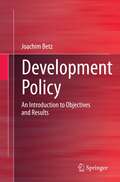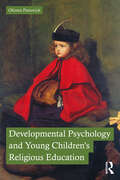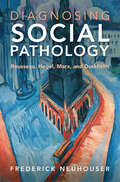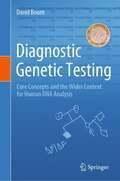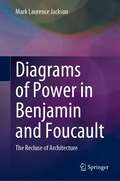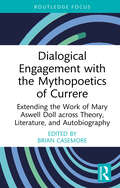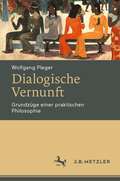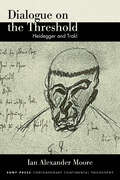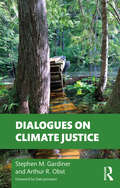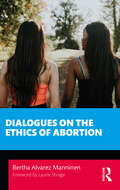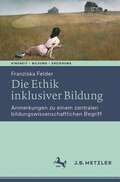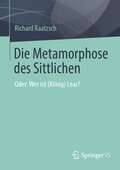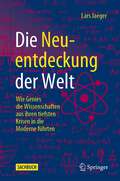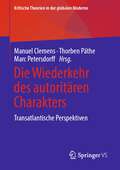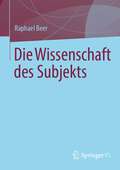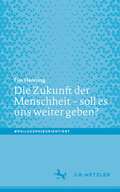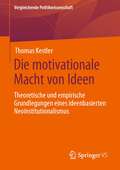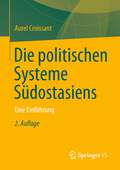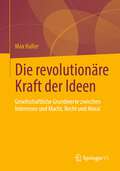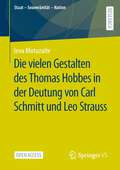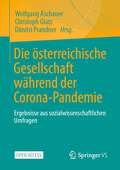- Table View
- List View
Development Policy: An Introduction to Objectives and Results
by Joachim BetzDeveloping countries have made rapid but highly varied progress since the 1990s. So much so that the boundaries to the traditional industrialized countries have become partially blurred. On the other hand, there are a number of mostly fragile states that have not succeeded in doing so, or have only rudimentarily succeeded. Talk of one "Third World" and common development problems thus explains little. Instead, development has become a requirement for all states, which this textbook breaks down and assesses according to key development goals.This book is a translation of the original German 1st edition Entwicklungspolitik by Joachim Betz, published by Springer Fachmedien Wiesbaden GmbH, part of Springer Nature in 2021. The translation was done with the help of artificial intelligence (machine translation by the service DeepL.com). A subsequent human revision was done primarily in terms of content, so that the book will read stylistically differently from a conventional translation. Springer Nature works continuously to further the development of tools for the production of books and on the related technologies to support the authors.
Developmental Psychology and Young Children’s Religious Education
by Olivera PetrovichDevelopmental Psychology and Young Children’s Religious Education sets out to identify the conceptual pre-requisites for young children’s religious education learning and clearly highlights the challenges that children and their teachers encounter in the RE educational process. Based on a study with 431 children aged 5 to 7 years from different schools, faith and non-faith, and 47 teachers from the same schools as the children, this book offers an insightful look into younger children’s religious education, providing statistical evidence to dismantle the belief that young children lack the ability to conceptualise God in abstract terms. The information obtained from these children and their teachers reveals a major discrepancy between the teachers’ perceptions of young children’s conceptual abilities for RE learning, on the one hand, and children’s actual abilities revealed in their responses throughout the study, on the other. Based on the evidence described in the volume, Petrovich argues that teacher-training courses for primary RE need to be designed to include a substantial component of contemporary developmental research that is of direct relevance to children’s conceptual abilities and understanding of abstract concepts. Developmental Psychology and Young Children’s Religious Education is essential reading for students and researchers in developmental psychology, religious education, teacher education, education studies and cultural anthropology.
Diagnosing Social Pathology: Rousseau, Hegel, Marx, and Durkheim
by Frederick NeuhouserCan a human society suffer from illness like a living thing? And if so, how does such a malaise manifest itself? In this thought-provoking book, Fred Neuhouser explains and defends the idea of social pathology, demonstrating what it means to describe societies as 'ill', or 'sick', and why we are so often drawn to conceiving of social problems as ailments or maladies. He shows how Rousseau, Hegel, Marx, and Durkheim – four key philosophers who are seldom taken to constitute a 'tradition' – deploy the idea of social pathology in comparable ways, and then explores the connections between societal illnesses and the phenomena those thinkers made famous: alienation, anomie, ideology, and social dysfunction. His book is a rich and compelling illumination of both the idea of social disease and the importance it has had, and continues to have, for philosophical views of society.
Diagnostic Genetic Testing: Core Concepts and the Wider Context for Human DNA Analysis
by David BournOver the last decade, technical advances have allowed genomic testing which provides a great opportunity for diagnosis but also an increased chance of uncertain or unexpected findings. This book addresses many of the questions that arise in this context and summarizes the essential concepts in diagnostic genetic testing in an easy-to-read manner. It also covers some broad context for the practical and ethical implications of examining human DNA sequences. The book starts with a general introduction to the field, providing enough background to allow readers without any previous education in genetics to comprehend the material in the subsequent chapters. The main part explores differing aspects of human genetics and the wider implications of testing in these areas. The author covers not only single gene inheritance, but also genetic testing of cancers and how testing benefits the patients. Special emphasis is also given to the questions of genetics and identity. The concluding part then draws the main themes together and summarises the wider significance of genetics. It also explores the gap between promises made for the impact of advances in genetics, and the actual benefits to patients. The book is written for everyone interested to learn about the process of genetic testing and the broader implications. Moreover, it is aimed at health professionals with an interest in genetics, at students or scientific trainees looking for an introduction to diagnostic genetics, and at professionals in health policy or health journalism.
Diagrams of Power in Benjamin and Foucault: The Recluse of Architecture
by Mark Laurence JacksonThis book’s overarching premise is that discussion and critique in the discourses of architecture and urbanism have their primary focus on engagements with form, particularly in the sense of the question as to what planning and architecture signify with respect to the forms they take, and how their meanings or content (what is “contained”) is considered in relation to form-as-container. While significant critical work in these disciplines has been published over the past 20 years that engages pertinently with the writings of Walter Benjamin and Michel Foucault, there has been no address to the co-incidence in the work of Benjamin and Foucault of an architectural figure that is pivotal to each of their discussions of the emergence of modernity: The arcade for Benjamin and the panoptic prison for Foucault have a parallel role. In Foucault’s terms, panopticism is a “diagram of power.” The parallel, for Benjamin, would be his understanding of “constellation.” In more recent architectural writings, the notion of the diagram has emerged as a key motif. Yet, and in as much as it supposedly relates to aspects of the work of Foucault, along with Gilles Deleuze, this notion of “diagram” amounts, for the most part, to a thinly veiled reinstatement of geometry-as-idea. This book redresses the emphasis given to form within the cultural philosophy of modernity and—particularly with respect to architecture and urbanism—inflects on the agency of force that opens a reading of their productive capacities as technologies of power. It is relevant to students and scholars in poststructuralist critical theory, architecture, and urban studies.“This is a book about Foucault and Benjamin and it is grounded in a deep knowledge of and reflection upon their works, but it is also underpinned by an impressive erudition. There are reflections on Hegel and Heidegger (central to the author) and Derrida, along with Kierkegaard, and others. This leads to a rich and suggestive discussion … in staging a spatial-architectural-political conversation between Foucault and Benjamin.”- Anonymous Reviewer“Mark Jackson’s Diagrams of Power in Benjamin and Foucault, The Recluse of Architecture juxtaposes and interrogates its two leading actors so as to draw from and through them a theory of architecture, which is inseparable from its recluse. In doing so it elaborates a series of complex connections with their various interlocutors and inspirations, Hegel, Heidegger, Derrida, the Kabbalah, Agamben, allegory, Marx, Deleuze, Klossowski, tragedy, capitalism, modernity, and so on. The list is long and impressive. This is not only done with an extremely high degree of scholarship, but is presented in a light, lucid and very compelling manner in a voice both personal and authoritative. The recluse is the figure of mimesis itself, the appearance of a withdrawal, always already a ruin. This book not only contributes a highly astute reading of its philosophical objects, but it enacts the ontology of the recluse through its own unfolding, simultaneously revealing and withholding the meaning of architecture ‘as such’, so that we not only understand its meaning, but feel the pulsing differential of the book’s object as if it were alive within us.”- Stephen Zepke, Independent Researcher, Vienna
Dialogical Engagement with the Mythopoetics of Currere: Extending the Work of Mary Aswell Doll across Theory, Literature, and Autobiography (Studies in Curriculum Theory Series)
by Brian CasemoreThis volume showcases a series of chapters that elaborate on Mary Aswell Doll’s contributions to the field of curriculum theory through her examination of currere as a mythopoetics. By bringing Doll’s Jungian, autobiographical, and literary perspectives into conversation with emergent forms of subjective inquiry—including aesthetic concepts, ecological questions, and spiritual themes—the volume foregrounds the originality and significance of Doll’s book The Mythopoetics of Currere in particular, while simultaneously extending it and demonstrating its applications in various scholarly conversations. Leading scholars in the field of curriculum studies such as William F. Pinar and Molly Quinn demonstrate how they use Doll’s ideas as pedagogy, as theoretical framing for their work, and as the basis of their own study and self-exploration. A response essay from Doll herself concludes the text, bringing further thought and insight to the mythopoetic dimensions of currere. This text will benefit scholars, academics, and students in the fields of curriculum studies, curriculum theory, and the foundations of education more broadly. Teachers and teacher educators interested in the conceptualization of curriculum in humanities education will also benefit from this volume.
Dialogische Vernunft: Grundzüge einer praktischen Philosophie
by Wolfgang PlegerDer Mensch ist als Person für sein Handeln verantwortlich. Er antwortet in einem Spielraum der Freiheit auf die vielfältigen Herausforderungen von praktischen Situationen im sozialen Leben und in seiner natürlichen Mitwelt. Der Maßstab der Verantwortung ist die Vernunft. Der Dialog eröffnet die Chance, ihren konkreten Anspruch zu ermitteln und zu prüfen. Das Buch bietet eine historisch-systematische und interdisziplinär angelegte Einführung in grundlegende Themen der praktischen Philosophie, wie Ethik und Menschenrechte, Geschichte und Gesellschaft, Politik und Pädagogik sowie Kultur und Technik. Jeder Bereich wird durch drei bis vier Positionen vorgestellt und durch zentrale Zitate anschaulich erläutert. Vertreten sind neben philosophischen Konzepten solche aus den Natur-, Sozial- und Kulturwissenschaften. Der geschichtliche Bogen spannt sich von Solon, der den Gedanken des Rechtsstaates entwickelte, bis hin zu Corine Pelluchon, die sich im Zeitalter der ökologischen Krise mit der Frage der zukünftigen Bewohnbarkeit der Erde auseinandersetzt. Es schließt mit einem Plädoyer für dialogische Vernunft.
Dialogue on the Threshold: Heidegger and Trakl (SUNY series in Contemporary Continental Philosophy)
by Ian Alexander MooreIn the early 1950s, German philosopher Martin Heidegger proclaimed the Austrian expressionist Georg Trakl to be the poet of his generation and of the hidden Occident. Trakl, a guilt-ridden lyricist who died of a cocaine overdose in the early days of World War I, thus became for Heidegger a redemptive successor to Hölderlin. Drawing on Derrida's Geschlecht series and substantial archival research, Dialogue on the Threshold explores the productive and problematic tensions that pervade Heidegger's reading of Trakl and reflects more broadly on the thresholds that separate philosophy from poetry, gathering from dispersion, the same from the other, and the native from the foreigner. Ian Alexander Moore examines why Heidegger was reluctant to follow Trakl's invitation to cross these thresholds, even though his encounter with the poet did compel him to take up, in astounding ways, many underrepresented topics in his philosophical corpus such as sexual difference, pain, animality, and Christianity. A contribution not just to Heidegger and Trakl studies but also, more modestly, to the old quarrel between philosophy and poetry, Dialogue on the Threshold concludes with new translations of eighteen poems by Trakl.
Dialogues on Climate Justice (Philosophical Dialogues on Contemporary Problems)
by Stephen M. Gardiner Arthur ObstWritten both for general readers and college students, Dialogues on Climate Justice provides an engaging philosophical introduction to climate justice, and should be of interest to anyone wanting to think seriously about the climate crisis. The story follows the life and conversations of Hope, a fictional protagonist whose life is shaped by a terrifyingly real problem: climate change. From the election of Donald Trump in 2016 until the 2060s, the book documents Hope’s discussions with a diverse cast of characters. As she ages, her conversations move from establishing the nature of the problem, to engaging with climate skepticism, to exploring her own climate responsibilities, through managing contentious international negotiations, to considering big technological fixes, and finally, as an older woman, to reflecting with her granddaughter on what one generation owes another. Following a philosophical tradition established by Plato more than two thousand years ago, these dialogues are not only philosophically substantive and carefully argued, but also distinctly human. The differing perspectives on display mirror those involved in real-world climate dialogues going on today. Key Features: Written in an engaging dialogue form, which includes characterization, clear exchanges of ideas, and a compelling story arc Clearly organized to allow readers both in-depth consideration and rapid overviews of various topics Memorable examples that enable and encourage discussion inside and outside the classroom An Introduction to the book aimed at instructors, which includes helpful instructions for teaching the book and engaging student assignments
Dialogues on the Ethics of Abortion (Philosophical Dialogues on Contemporary Problems)
by Bertha Alvarez ManninenWhat happens when two intelligent and highly informed fictional college students, one strongly pro-choice and the other vigorously pro-life, are asked to put together a presentation on abortion? Their conversations over five days – friendly but lively, charitable but clear – are captured in this book. Through these dialogues, students and other interested readers are introduced to the difficult moral issues of abortion. In Chapter 1, readers learn about Roe v. Wade and other relevant legal cases. Chapter 2 covers basic, philosophical issues such as: What is a person? Are fetuses persons? Is fetal potential morally relevant? How shall we define the moral community? Chapter 3 introduces students to Don Marquis’s "Why Abortion is Immoral" and also the metaphysical issues of personal identity and its relevance to abortion. Chapter 4 covers Judith Jarvis Thomson’s "A Defense of Abortion", including objections and responses to the argument from bodily autonomy. Finally, Chapter 5 looks at abortion in hard cases, such as in cases of rape, fetal disability, non-viable pregnancies, and sex-selection; the chapter also includes a conversation on fathers and abortion. With a Foreword by Laurie Shrage, topics headings in the margins, and an annotated bibliography, Dialogues on the Ethics of Abortion is an easy-to-use volume and valuable resource for anyone interested in a fair and clear-headed approach to one of the most contentious moral issues of our time.
Dialogues on the Ethics of Abortion (Philosophical Dialogues on Contemporary Problems)
by Bertha Alvarez ManninenWhat happens when two intelligent and highly informed fictional college students, one strongly pro-choice and the other vigorously pro-life, are asked to put together a presentation on abortion? Their conversations over five days – friendly but lively, charitable but clear – are captured in this book. Through these dialogues, students and other interested readers are introduced to the difficult moral issues of abortion. In Chapter 1, readers learn about Roe v. Wade and other relevant legal cases. Chapter 2 covers basic, philosophical issues such as: What is a person? Are fetuses persons? Is fetal potential morally relevant? How shall we define the moral community? Chapter 3 introduces students to Don Marquis’s "Why Abortion is Immoral" and also the metaphysical issues of personal identity and its relevance to abortion. Chapter 4 covers Judith Jarvis Thomson’s "A Defense of Abortion", including objections and responses to the argument from bodily autonomy. Finally, Chapter 5 looks at abortion in hard cases, such as in cases of rape, fetal disability, non-viable pregnancies, and sex-selection; the chapter also includes a conversation on fathers and abortion. With a Foreword by Laurie Shrage, topics headings in the margins, and an annotated bibliography, Dialogues on the Ethics of Abortion is an easy-to-use volume and valuable resource for anyone interested in a fair and clear-headed approach to one of the most contentious moral issues of our time.
Die Erziehung der Vernünftigen: Politischer Liberalismus und öffentliche Bildung
by Frodo PodschwadekDieses Buch bietet die erste ausgearbeitete Darstellung politisch-liberaler Bildung und verbindet eine gründliche Analyse der theoretischen Grundlagen mit anwendungsorientierten Ansätzen für zeitgenössische pädagogische Herausforderungen. Neben einer eingehenden Auseinandersetzung mit den Unzulänglichkeiten der Rawls'schen Theorie und der Erörterung einiger zentraler Einwände gegen neutralitätsbasierte Beschränkungen in der Bildung bietet der Band eine aufschlussreiche Diskussion von Themen wie gleichgeschlechtliche Beziehungen in der Sexualerziehung, die Stellung von Kindern mit Migrationshintergrund und das Recht religiöser Eltern, die Erziehung ihrer Kinder zu bestimmen. Das Buch skizziert ein politisch-liberales Bildungsverständnis, das einen nützlichen Beitrag zu den aktuellen Debatten über Liberalismus und Bildung leistet, wie er in der bisherigen Literatur zum politischen Liberalismus nicht zu finden ist. Es ist von Interesse für alle, die an der Schnittstelle von politischer Philosophie und Bildungsphilosophie arbeiten, sowie für Wissenschaftler, die ein breiteres Interesse daran haben, wie der Liberalismus auf die Herausforderungen des Wertepluralismus reagieren kann.
Die Ethik inklusiver Bildung: Anmerkungen zu einem zentralen bildungswissenschaftlichen Begriff (Kindheit – Bildung – Erziehung. Philosophische Perspektiven)
by Franziska FelderBeginnend in den frühen 2000er Jahren ist Inklusion in den letzten Jahrzehnten immer stärker in den Fokus (praktischer, theoretischer wie empirischer) Bildungsbemühungen gerückt. Insbesondere die Sonderpädagogik, aber nicht nur sie, ist mit einer nie dagewesenen Entwicklung konfrontiert. Inklusion zweifelt die Existenzberechtigung der Sonderpädagogik an und fordert auch die Allgemeine Pädagogik mit ihren Ausschlussmechanismen heraus. Viele Debatten und unzählige Veröffentlichungen in der Inklusionspädagogik berühren direkt praktische und politische Umsetzungsfragen – von Fragen der Didaktik und Methodik inklusiven Unterrichts, bis hin zur Frage, wie Lehrpersonen entsprechende inklusive Einstellungen entwickeln können. Relativ spärlich aber gestaltet sich der inklusive Grundlagendiskurs. Insbesondere fehlen Ansätze zur ethischen Grundlegung inklusiver Bildung weitgehend. Dabei wäre das genau wichtig, denn Umsetzungsfragen berühren in pädagogischen Kontexten immer auch normative Zielperspektiven. Genau an diesem Punkt setzt das Buch an. Es fragt u.a. danach, welche deskriptive Aussagekraft dem Begriff der Inklusion zukommt, welche ethisch-normative Basis Inklusion hat und was davon in der pädagogischen Anwendung zentral ist. Das Buch thematisiert weiter auch, welchen Stellenwert Behinderung in dieser ganzen Debatte hat. Und nicht zuletzt befragt es eine Reihe von Mythen in der Inklusionsliteratur nach ihrer Plausibilität, u.a. dass Inklusion mit der Akzeptanz von Heterogenität gleichgesetzt werden kann oder dass eine radikale Dekategorisierung zu mehr Inklusion führen führt.
Die Geschichte des Kommunismus und des Marxismus-Leninismus: Die Geschichte des Kommunismus und des Marxismus-Leninismus: Von seinen Anfängen bis zum Niedergang
by Willem Brownstok Martin Bakers Tobias Lanslor1988Jahr2Ab Mai veranstaltete die Moldauische Demokratische Bewegung (ehemals Moldawien) öffentliche Konferenzen, Demonstrationen und Popfestivals, aber ihr Umfang und ihre Intensität wuchsen allmählich. Auf der Straße ist das Zentrum der öffentlichen Manifestation das Stephen Grand Monument in Chisinau und der angrenzende ParkAleea Clasicilor("Klassische Gasse"). 1988Jahr1Mond15Am Sonntag reichte Anatol Shalal zu Ehren der Büste von The Alea Clasciller von Mihai Eminescu einen Vorschlag zur Fortsetzung des Treffens ein. Im öffentlichen Diskurs forderte die Bewegung das Erwachen des Volkes, die Redefreiheit, die Wiederbelebung moldauischer Traditionen und den Erwerb des öffentlichen Status auf Rumänisch und die Rückkehr zum lateinischen Alphabet. Als der Übergang von der "Bewegung" (informelle Vereinigungen) zur "Fronten"-Bewegung (formelle Assoziationen) an öffentlicher Dynamik gewann, wurde sie als natürliches "Upgrade" angesehen, und die sowjetischen Behörden wagten es nicht mehr, sie niederzuschlagen.1988Jahr4Mond26Am 19., einem Marsch, der vom Ukrainischen Kulturklub in der K.K.'s Khreschatyk Straße veranstaltet wird500Reaktorunfall von Tschernobyl2Zur Feier des 20-jährigen Bestehens trug er Plakate mit Slogans wie "Offenheit und Demokratie beenden". 1988Jahr5Vom Mond6Im Laufe des MonatsUkrainische Katholiken in der Westukraine feierten heimlich das christliche Millennium des Großfürstentums Kiew, indem sie in den Wäldern von Buniv, Karsch, Khossiff und Zarbanizia dienten. 1988Jahr6Mond5Am 19., als die offizielle Feier des Millenniums in Moskau stattfand, veranstaltete der Ukrainische Kulturklub seine eigenen Veranstaltungen am Denkmal von St. Volodimir dem Großen, dem Großfürsten von Kiew.
Die Metamorphose des Sittlichen: Oder: Wer ist (König) Lear?
by Richard RaatzschDie Idee, dass Moral eine bestimmte Form hat, ist eine alte Idee. Die Mächtigkeit dieser Idee zeigt sich unter anderem darin, dass auch Autoren sich auf diese Idee beschränkt haben, deren Werk man unter anderem dazu verwenden kann, dass man mit Verweis auf dieses Werk definiert, was Ethik ist. Das hat diesen Autoren den Vorwurf des Formalismus eingebracht: sie würden nur die Form der Moral bestimmen, aber gar nicht sagen, was wir nun tun und lassen sollen. Am Beispiel von Shakespeares Stück vom König Lear soll hier gezeigt werden, dass die Form der Moral nichts Unveränderliches ist. Die Form wandelt sich, und mit ihr der Inhalt, weil es Inhalt nur in dieser oder jener Form gibt und weil die Form dem Inhalt wesentlich ist. Damit fällt der Vorwurf des Formalismus nicht weg, sondern in sich zusammen.
Die Neuentdeckung der Welt: Wie Genies die Wissenschaften aus ihren tiefsten Krisen in die Moderne führten
by Lars JaegerBahnbrechende Erkenntnisse und tiefe Krisen, revolutionäre Entdeckungen und Widerlegung von bis dato unverrückbaren Glaubenssätzen – die Jahre zwischen 1870 und 1950 sind geprägt durch wissenschaftliche Errungenschaften zahlreicher Genies und junger Vordenker. Erkenntnisse, die das Verständnis von der Welt, von Raum, Zeit und Unendlichkeit, von Leben und Menschheit, Logik und Berechenbarkeit nahezu über Nacht aushebelten. Einige der Akteure, wie Georg Cantor oder Ludwig Boltzmann, aber auch Albert Einstein und Kurt Gödel sind darüber fast verrückt geworden.Lars Jaeger illustriert, wie eng in diesen 80 Jahren Genialität, Intuition und Krise beieinanderlagen, und wie ein Inferno an geistigen Revolutionen unser heutiges Leben und Denken prägt. Dies geht weit über die Physik mit ihrer Quantentheorie und Relativitätstheorie hinaus, deren Revolutionen am häufigsten dargestellt werden, sondern betrifft auch die Biologie (Evolutionstheorie und Genetik), die Chemie (Molekularstrukturen), die Psychologie (das Unbewusste) und andere wissenschaftliche Disziplinen. Spannende Anekdoten aus dem Leben bekannter Wissenschaftler illustrieren, wie sich ein neues Denken aus einer Kraft der intuitiven Genialität zuerst in den Köpfen der Genies dieser Zeit implementierte, und dann die Grundlage des modernen wissenschaftlichen Denkens und technologischen Fortschritt - und damit wohl auch die Entwicklung der Menschheit insgesamt - bildete. Informativ, unterhaltsam und spannend wie ein Wissenschaftskrimi erzählt Lars Jaeger, wie eng die Entstehung der modernen Wissenschaften von Physik und Mathematik über die Chemie bis hin zur Biologie und Psychologie mit existenziellen Krisen ihrer Entdecker und Entwickler verknüpft ist.
Die Wiederkehr des autoritären Charakters: Transatlantische Perspektiven (Kritische Theorien in der globalen Moderne)
by Manuel Clemens Thorben Päthe Marc PetersdorffWer sich in den letzten Jahren mit dem autoritären Charakter beschäftigt, begibt sich stets in die etwas paradoxe Gefahr, von einer noch älteren Version dieser Figur überholt zu werden. Was in den anti-autoritären 1970er Jahren durch unhaltbar gewordene Prämissen auf theoretischer Ebene abgebaut, in komplexer gelagerte Machtdiskurse überführt und durch Reformen in den pädagogischen, medialen und politischen Institutionen auf praktischer Ebene überwunden oder zumindest gezähmt zu sein schien, taucht Mitte der 2010er Jahre überraschend ‚originalgetreu‘ wieder auf und scheint sich seitdem in permanenter Annäherung an seinen Ursprung zu aktualisieren. Wie verfährt man also mit dem autoritären Charakter? Der vorliegende Sammelband versucht, diese Frage auf zwei Wegen anzugehen. Zum einen nimmt er die Gefahr in Kauf, in seinen Bestandsaufnahmen von aktuellen Entwicklungen überholt zu werden. Zum anderen begibt er sich selbst an den Ursprung zurück und versucht in den ersten Überlegungen der Frankfurter Schule und den Versuchen, den autoritären Charakter zu erforschen, bisher unbeachtete Stellen zu beleuchten. Allerdings ist auch bei einer solchen Rückkehr klar, dass sie nicht am Ursprung stehen bleiben kann. Es sind dann wiederum diese geschärften bzw. revidierenden Betrachtungen, mit denen etliche AutorInnen die Frage für die Gegenwart erneut stellen.
Die Wissenschaft des Subjekts
by Raphael BeerMit dem Subjekt wird eine logisch nicht hintergehbare Entität benannt, die sich aus den Prämissen des Radikalen Konstruktivismus ableiten lässt. Damit ist jedoch wenig gesagt, weil ein reines Subjekt nicht mehr ist als ein Subjekt. Mit dem Fokus auf die Wissenschaft soll es daher auf die Gesellschaft bezogen werden. Die zentrale Frage ist dann, wie lässt sich eine Wissenschaft vor dem Hintergrund eines radikalen Subjektbegriffes konzipieren. Eingebettet sind diese Überlegungen in das Projekt einer Kritischen Theorie der Gesellschaft.
Die Zukunft der Menschheit – soll es uns weiter geben? (#philosophieorientiert)
by Tim HenningEin nahes Ende der Menschheit ist für die meisten von uns eine bedrohliche Vorstellung – z.B. als ein Aspekt dessen, was Pandemien und den Klimawandel so beängstigend macht. Aber ist es eigentlich wirklich wünschenswert, dass es weiter Menschen gibt? Worin würde der Schaden bestehen, wenn keine neuen Menschen mehr entstehen würden? Ist es vielleicht sogar umgekehrt ein Schaden, wenn weiter neue Menschen zur Existenz gebracht werden – für den Rest der Welt, vielleicht aber sogar für diese neuen Menschen selbst? Auch die Vorstellung von einem kontinuierlichen Wachstum der menschlichen Bevölkerung macht vielen von uns Angst. Wenn es also in Zukunft Menschen gibt – wie viele sollten es sein? Je mehr desto besser, auch auf Kosten der individuellen Lebensqualität? Oder sind neue Menschen nur solange willkommen, wie sich niemand einschränken muss? Der vorliegende Band führt in diese existenziellen Zukunftsfragen ein. Knapp, pointiert und ohne Jargon präsentiert er die frappierenden und inspirierenden Argumente, mit denen die aktuelle Philosophie unsere Zukunft durchdenkt.
Die motivationale Macht von Ideen: Theoretische und empirische Grundlegungen eines ideenbasierten Neoinstitutionalismus (Vergleichende Politikwissenschaft)
by Thomas KestlerDieses Buch behandelt die motivationale Bedeutung von Ideen in kollektiven Handlungszusammenhängen. Es entwickelt ein motivationspsychologisch und sozialphilosophisch begründetes Modell, das dem ideenbasierten Neoinstitutionalismus eine handlungstheoretische Mikrofundierung verschafft. Der Zusammenhang zwischen Ideen und kollektivem Handeln wird anhand dreier Untersuchungsfälle – der Partei Bündnis 90/Die Grünen aus Deutschland, der brasilianischen Arbeiterpartei und der Tea Party-Bewegung in den USA - in historisch-vergleichender Perspektive rekonstruiert.
Die politischen Systeme Südostasiens: Eine Einführung
by Aurel CroissantAufgrund ihrer wachsenden wirtschaftlichen Bedeutung, als Ort dramatischer Demokratisierungsprozesse und als Schauplatz im "Kampf gegen den Terror" ist das Interesse an der Region Südostasien in den vergangenen Jahren stetig gewachsen. Die Studie soll dem Leser eine politikwissenschaftliche Einführung in drei zentrale Bereiche der politischen Systeme in der Region bieten: Strukturen, Prozesse und Politikergebnisse.
Die revolutionäre Kraft der Ideen: Gesellschaftliche Grundwerte zwischen Interessen und Macht, Recht und Moral
by Max Haller„Werte“ sind ein beliebtes Thema von politischen Sonntagsreden und sie dienen politischen Institutionen und ihren Vertretern immer wieder dazu, sich nach außen gut darzustellen und problematische Aktionen (wie Kriege) zu legitimieren. Die Reaktion der Sozialwissenschaften ist vielfaches Naserümpfen und kritische Distanz zu Wertedebatten.Dieser Band geht dagegen aus von der Weberschen These, dass Ideen und Werte historisch ebenso starke Kräfte sein können wie ökonomische Interessen und politisches Machtstreben. Im Gegensatz zu umfangreichen sozial- und rechtsphilosophischen Werken, die sich vielfach in einer Endlosschleife ohne definitive Lösungen verheddern, wird in diesem Band jedoch argumentiert, dass die Thematisierung und Durchsetzung von gesellschaftlichen Grundwerten nur als Resultat der Auseinandersetzungen zwischen kritischen neuen Ideen, sozialen Bewegungen und Kämpfen, die von der Bevölkerung unterstützt werden, und politischen Reformen und Innovationen verstanden werden kann. Es zeigt sich, dass man in langfristiger historischer Perspektive tatsächlich von einer zunehmenden Durchsetzung der (neun) gesellschaftlichen Grundwerte ausgehen kann. Diese verläuft allerdings keineswegs bruchlos und linear, sondern ist durch vielfache zeitliche Verwerfungen, Verzögerungen und Rückschritte gekennzeichnet.Dieser Band markiert einen entscheidenden theoretischen Durchbruch in einer vielumstrittenen und bislang vielfach inkonklusiven Debatte. Er ist dazu auch deshalb in der Lage, weil er auf einem stringenten theoretischen Ansatz aufbaut, welcher der empirischen Werteforschung vielfach fehlt. Dabei bezieht er einen breiten Fundus an Literatur aus allen einschlägigen Geistes- und Sozialwissenschaften ein, von Theologie, Philosophie und Rechtswissenschaften über Ökonomie und Soziologie bis hin zur Psychologie.
Die sinnstiftende Wirkung der Logotherapie von Vıktor Frankl
by Teria ShantallDieses Buch bietet eine eingehende Analyse der Logotherapie von Viktor Frankl und taucht in die spirituellen Tiefen einer inhärenten Suche nach dem Sinn des Lebens ein. Geschrieben von einem sehr erfahrenen und kompetenten Logotherapeuten, der von Frankl selbst ausgebildet wurde, ist dieses Buch aufregend neu und einzigartig, da es den Leser in der Rolle des Klienten, begleitet vom Autor in der Rolle des Therapeuten, durch den sich entfaltenden, phasenweisen Prozess der Logotherapie führt. Die Logotherapie wird als Tiefen- und als Höhenpsychologie erforscht. Ausgehend von einem provozierten Willen zum Sinn aus den Tiefen des spirituellen Unbewussten führt der Autor die Suche nach dem Sinn zu den ultimativen Höhen bei der Erreichung der menschlichen Größe. Dieses Buch lässt Frankls eigene tiefe Lebensorientierung wieder lebendig werden und hat in seinem leserfreundlichen Stil die Frische von Frankls eigener Art zu schreiben. Es ist in einem erfrischend einfachen und geradlinigen Stil geschrieben, der einer breiten Leserschaft leicht zugänglich ist. Es enthält Fallstudien und Übungen für die Leser und ist für den Einsatz in Logotherapiekursen weltweit gedacht. Darüber hinaus wird es Laien, die einen tieferen Sinn für ihr Leben suchen, Psychologiestudenten und Fachleute für psychische Gesundheit gleichermaßen ansprechen.
Die vielen Gestalten des Thomas Hobbes in der Deutung von Carl Schmitt und Leo Strauss (Staat – Souveränität – Nation)
by Ieva MotuzaiteDieses Open-Access-Buch stellt eine Untersuchung der Rezeption der politischen Philosophie Thomas Hobbes’ durch Carl Schmitt und Leo Strauss dar. Dies erfolgt zum einen anhand der Kontextualisierung, zum anderen durch eine textimmanente Aufarbeitung der relevanten Schriften beider Autoren. Die Letzteren werden als Teil des jeweiligen Gesamtwerkes von Schmitt und Strauss sowie als Teil der ideengeschichtlichen Forschungsdebatten zu Hobbes betrachtet. Es wird gezeigt, welche Einflüsse durch Vorgänger und Zeitgenossen Schmitt und Strauss in ihrem Hobbes-Verständnis erfuhren, wie sie ihre Anlehnung sowie Distanzierung zum Ausdruck brachten und wie wiederum ihre Hobbes-Interpretationen rezipiert wurden. Die Kontextualisierung dient als Hintergrund für die inhaltliche Analyse des Textmaterials, mit der die Fragestellungen der Hobbes-Deutungen, die ihnen zugrunde liegenden Annahmen, theoretischen und politischen Zielrichtungen sowie die Hauptlinien der Argumentationen und die Logik des Textbaus aufgedeckt werden. Die Untersuchung bringt die Vielfalt der Hobbes-Bilder zur Geltung, die in den jeweiligen Interpretationen generiert wurden.
Die österreichische Gesellschaft während der Corona-Pandemie: Ergebnisse aus sozialwissenschaftlichen Umfragen
by Wolfgang Aschauer Dimitri Prandner Christoph GlatzIn diesem Buch untersuchen Soziolog*innen und Umfrageforscher*innen erstmals systematisch in zehn fundierten Beiträgen die gesellschaftlichen Auswirkungen der Corona-Krise in Österreich. Datengrundlage des Sammelbandes, dessen Beiträge frei zum Download zur Verfügung stehen, sind mehrere Umfrageprojekte, die teils in mehreren Erhebungswellen über die Krisenzeit durchgeführt haben. Die Beiträge im Buch fokussieren primär auf die Zeit des ersten Lockdowns in Österreich und diskutieren – basierend auf den empirischen Befunden – die Folgen der Corona-Krise auf verschiedene Bereiche des Lebens.
